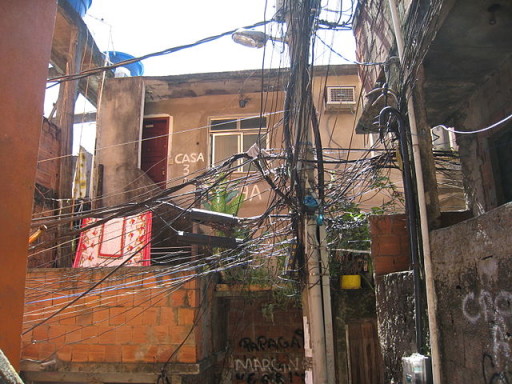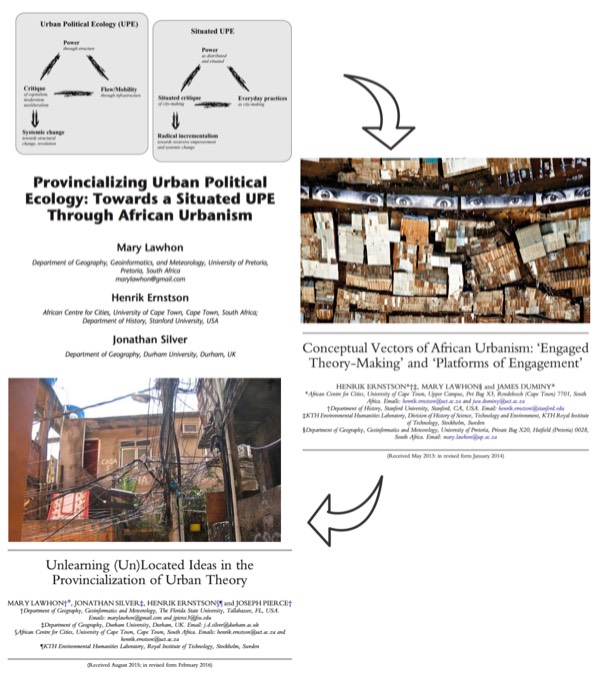A new publication from our Situated UPE Collective was just published in Regional Studies by Mary Lawhon, Jonathan Silver, Henrik Ernstson and Joseph Pierce. It continues our contribution to Urban Political Ecology and Urban Studies.

Figure: Photo by Alicia Nijda, Wikimedia Commons. https://commons.wikimedia.org/wiki/File:Alicia_Nijdam-rocinha.jpg
Postcolonial scholars have argued for the provincialization of urban knowledge, but doing so remains an opaque process. This paper argues that explicit attention to ‘learning to unlearn’ unstated theoretical assumptions and normativities can aid in provincialization, and demonstrate ways in which theorizing entails a socio-spatial situation. The authors’ efforts to grapple with operationalizing learning to unlearn in three different urban cases are described, followed by an articulation of strategies for theorizing which more explicitly acknowledge theory-building’s situatedness as well as points of reflection for developing postcolonial urban theory. The authors argue that this usefully shifts the focus of unlearning from ‘who’ is theorizing ‘where’ towards theory’s unstated norms and assumptions.
Intervention in UPE and Urban Studies
The new paper on “Unlearning (Un)located Ideas” (2016) follows our two previous co-authored papers, in Antipode on “Provincializing Urban Political Ecology” (2014) and in Regional Studies “Conceptual Vectors of African Urbanism” in (2014). Together they constitute a theoretical intervention and exploration of Urban Political Ecology and Urban Studies that aims to develop a situated approach to cultural and material politics of urban life that draws a lot of its energies from postcolonial and global South urbanism literature.

Three Situated UPE paper 2014-2016 small3
The arc we are traversing, follows one of seeing how UPE has operated as a crucial discourse to politicise urban environments and urbanisation as a process that transforms ’nature’ into social forms of power. UPE’s contributions have been to understand how the material of the city is configured to maintain and enforce social forms of power, and how urbanisation is part of wider economic, geographical and profit-driven processes.
We have then explored how the ‘image of the city’ has changed through the work of global South urbanists. Theoretically this literature centres around the postcolonial insight that ‘location’, or from where one theorises, is important to take into account when making sense of (new) empirical situations.
When the bulk of urban theory comes from a quite different spatiotemporal situation, an industrialising Europe and North America, global South urbanists helps to be cautious of how far such ‘Northern theory’ is in its reach and how well it can explain practical and empirical situations. This means to re-insert the ‘localness’ of European thought to allow for experiences of urbanization and scholarship from different regions to take hold and influence theory-making. For instance, global South urbanists have foregrounded the important role that ‘informality’ and everyday practices plays in the politics of urban environments and urbanisation. And to depart from the everyday and ‘informality’ is one line of thought we are pursuing, see for instance our new research project in Uganda, HICCUP. This way of working does not mean to set aside ‘wider’ economic and geographical processes, but it means to call for a re-alignment from where one can theorise cities and urbanisation, and extend the ways by which specific geographical and historical experiences can feed into thinking cities, political ecologies etc. This reading of global South urbanists have helped us to “provincialize” UPE, i.e. to re-tune and extend its basic critical project, and it has influenced our work to try to build an extended analytics (with adjoining new methods) through which we can re-think how urban environments are politicised.
In this our latest publication on “Unlearning (Un)located Ideas” we reflect explicitly on what this work of “provincialisation” means in practice for us as scholars, i.e. how do we, in our own empirical projects, de-centre our habits of thought, our training as critical scholars so as to let actual cities and forms of urbanisation that we study—its people, technologies, places and their particular histories etc.—speak into theory.
You can read our three publications here:
“Provincializing Urban Political Ecology”, 2014 in Antipode
“Conceptual Vectors of African Urbanism”, 2014, in Regional Studies
“Unlearning (Un)located Ideas” 2016, in Regional Studies
Also check out our newly funded project: Heterogeneous Infrastructure Configurations in Cities in Uganda Project (HICCUP).


